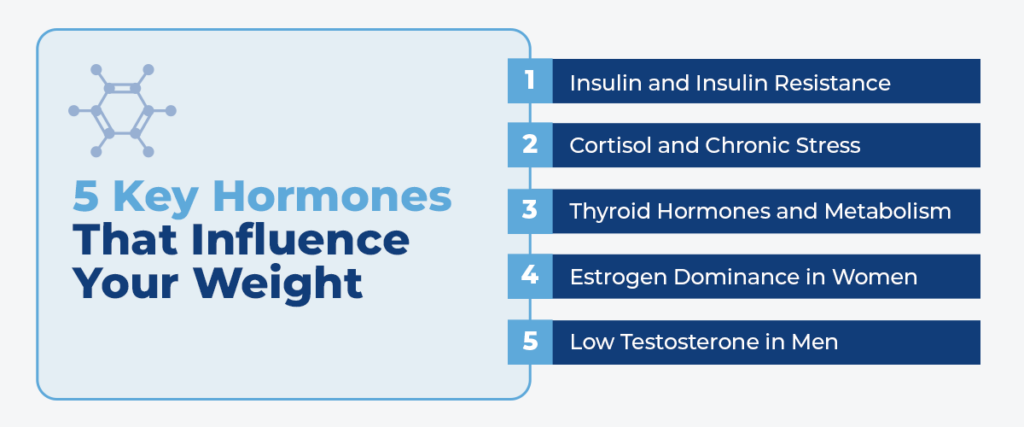How Hormone Imbalance Affects Weight Loss
Our body’s hormones can impact how we lose weight. The endocrine system, which produces hormones, regulates various bodily functions, including metabolism, appetite and fat storage, or adiposity. If you’re having difficulty losing weight despite diet and exercise, a hormonal imbalance might be at play. High cortisol levels, the stress hormone, can increase fat storage in the body, while leptin resistance can make it hard to know when we’re full. Additionally, nearly 5% of Americans have hypothyroidism, sometimes without knowing, which can slow the metabolism and make it challenging to lose weight.
Read on to explore the relationship between hormones and weight, and treatment options that could help on the path toward a more successful weight loss journey.
The Hormonal Connection to Weight
Hormones control major functions in our body, including signals related to appetite, satiety and energy. The endocrine system controls many bodily functions that influence weight, including:
- Appetite regulation: Leptin, produced by fat cells, signals fullness to the brain, while ghrelin, the hunger hormone, stimulates appetite when your stomach is empty. Leptin resistance can cause the body to perceive itself as not full when it actually is, while high ghrelin levels can increase hunger. Imbalances in both of these hormones can lead to overeating and weight gain.
- Fat storage: Insulin helps the body store fat. Individuals with insulin resistance may experience hyperglycemia and increased adiposity. Imbalanced estrogen levels and hypothyroidism can also lead to increased fat storage, particularly around the abdomen.
- Stress: Chronic stress can elevate cortisol levels, which can increase one’s appetite for high-fat, high-sugar foods while promoting fat storage, especially around the abdomen.
- Metabolism: Thyroid hormones triiodothyronine (T3) and thyroxine (T4) control the body’s metabolism and ability to burn calories. Muscle mass also impacts basal metabolic rate, as muscle tissue is more metabolically active than adipose tissue, even at rest.

5 Key Hormones That Influence Your Weight
Hormone dysregulation can influence weight management in many ways, from a drop in estrogen due to menopause or elevated cortisol from chronic stress. The five main hormones that can influence your weight are:
1. Insulin and Insulin Resistance
Insulin resistance traps the body in a cycle of fat storage, making it challenging to manage or lose weight despite caloric restrictions. Insulin is a protein hormone that facilitates the transfer of glucose from the bloodstream into cells for energy. When cells become resistant to insulin, the pancreas produces even more of it and pushes excess glucose into fat cells, especially in the abdominal area. This can lead to glycemic variability, causing cravings and overeating.
2. Cortisol and Chronic Stress
Cortisol is the body’s primary stress hormone. When under a lot of stress, persistently elevated cortisol can raise blood sugar, increasing appetite, intensifying cravings for high-fat, high-sugar foods and causing fat to accumulate around the abdomen. With psychosocial stressors, insufficient sleep and overeating, cortisol may stay elevated, creating a cycle of stress, snacking and fat storage.
3. Thyroid Hormones and Metabolism
Thyroid hormones T3 and T4 help regulate your basal metabolic rate. An underactive thyroid, or hypothyroidism, slows the body’s metabolism and increases fatigue. The result can be gradual weight gain, edema and trouble losing weight, even when maintaining a nutritious diet. Other signs of low thyroid can include cold intolerance, dry skin, slowed gastrointestinal motility and thinning hair.
4. Estrogen Dominance in Women
Hormone imbalance affects weight loss in women through fat accumulation in their hips and thighs. It can also lead to water retention and more intense menopause symptoms like vasomotor symptoms (VSM), insomnia and hair loss. Fluctuations in perimenopause can also exacerbate this pattern, while the decline in estrogen postmenopause can cause fat to shift toward the abdomen. These changes reveal how estrogen influences the activity of adipose tissue and insulin sensitivity.
5. Low Testosterone in Men
Testosterone supports muscle mass, energy and insulin sensitivity. Low testosterone can cause weight gain in men by decreasing muscle mass, slowing metabolism and increasing fat storage. It can also diminish exercise drive, making it challenging to lose weight.
Beyond the Scale — Other Signs of Imbalance
Endocrine health can affect more than just weight. Knowing these signs can help expedite appropriate evaluation and management. Individuals struggling with hormone dysregulation may also experience:
- Persistent fatigue
- Mood swings, anxiety or depression
- Brain fog or difficulty concentrating
- Low libido
- Night sweats and other sleep troubles
- Hair thinning or loss
These symptoms often stem from the same imbalances that prevent weight loss, like insulin resistance, low thyroid, high cortisol or changes in estrogen, progesterone and testosterone. For instance, poor sleep increases ghrelin, which regulates hunger cues, while decreasing leptin, which influences feelings of fullness. This can drive late-night cravings and weight gain.
If any of this resonates with you, it might be time to look into your hormones as a factor.
A Modern Approach to Hormonal Health
Functional medicine can help with hormone imbalance and weight loss by exploring the etiology of your symptoms rather than simply managing them or trying a one-size-fits-all solution. In this modern approach, health care professionals will consider your specific hormone levels, including insulin, cortisol and thyroid hormones, along with related markers like gastrointestinal health, immune system, lipids, micronutrients, sleep quality and stress load.
Using this data, they can build a highly personalized plan that addresses your unique needs, from targeted nutrition to stress regulation and, when appropriate, hormone therapy, to support your body’s healing. With a personalized treatment plan and advanced testing, functional medicine can help correct the imbalances preventing your weight loss progress, helping you feel better and finally see consistent, sustainable results.
Why Trust Spartan Medical Associates?
At Spartan Medical Associates, we pair experienced providers with rigorous, evidence‑based care. Over the last decade, we’ve helped men and women optimize hormones, biomarkers and weight through comprehensive lab evaluations, advanced diagnostics and individualized plans — not one‑size‑fits‑all protocols.
As a virtual practice, we treat patients throughout North Carolina and Delaware from the convenience of your home or office. Our concierge-style model fosters open and transparent communication. When appropriate, we offer bioidentical hormone replacement therapy (BHRT) and weight‑management therapies alongside nutrition, sleep and stress support. Explore our client testimonials to see the difference our care could make in your life.
Find Your Balance With Spartan Medical Associates
Recognizing hormone imbalance symptoms can be the first step toward resuming your weight loss journey. At Spartan Medical Associates, we offer advanced diagnostics and evidence-based treatments, including BHRT when appropriate, to address low energy and issues related to appetite or metabolism. We believe the best hormone therapies for weight loss are comprehensive, evidence-based and factor in your specific labs, history and goals — not one-size-fits-all solutions.
That’s why our experienced providers design individualized protocols that might include hormone replacement therapy, longevity, biomarker optimization and nutrition and weight loss solutions for your physiology. By examining the root cause of your symptoms, we can help you overcome the cycle of ineffective efforts.
Call 704-237-6512 to request a free phone consultation and take the first steps to get your hormones and weight loss journey back on track.






